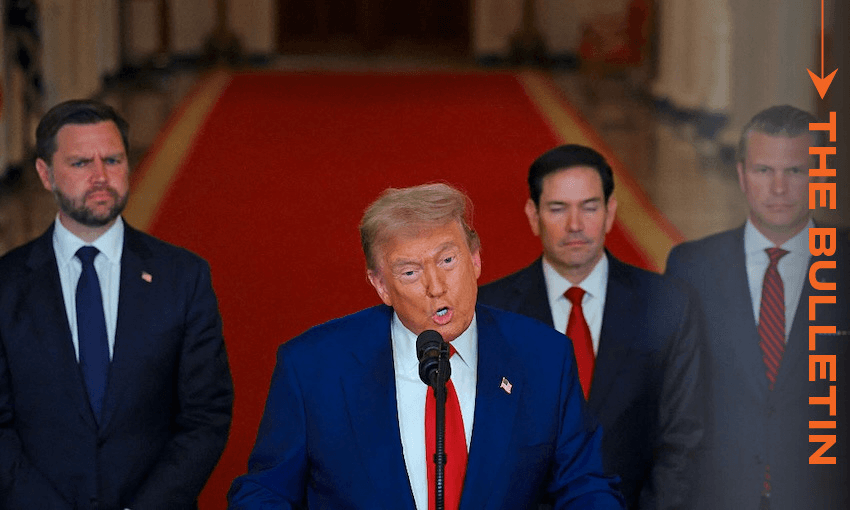New Zealand is preparing for a possible evacuation of citizens from Iran and Israel, while government ministers call for restraint, writes Catherine McGregor in today’s extract from The Bulletin.
To receive The Bulletin in full each weekday, sign up here.
Iran promises ‘everlasting consequences’ for US bomb attacks
Iran has lashed out at the United States following yesterday’s dramatic attack on three of its nuclear facilities, calling the bombing the first salvo in “a dangerous war” and a “barbaric violation” of international law. On Twitter/X, foreign minister Abbas Araghchi warned of “everlasting consequences” and said Tehran “reserves all options” in responding to the strikes on Fordow, Isfahan and Natanz. The International Atomic Energy Agency said there has been “no increase in off-site radiation levels” after the airstrikes.
The US attack, carried out with long-range B-2 bombers and massive “bunker buster” bombs, was announced by Donald Trump on Truth Social, followed by a brief speech from the White House in which he claimed Iran’s “nuclear enrichment facilities have been completely and totally obliterated”. The airstrikes came after more than a week of Israeli attacks on Iran’s military infrastructure and amid growing pressure on Trump to take a harder line. Iran’s response will determine whether the conflict expands further across the region.
NZ prepares evacuation mission
New Zealand’s official response has been cautious. “Diplomacy will deliver a more enduring resolution than further military action,” said foreign minister Winston Peters, adding that this was the “most serious” crisis he had dealt with, reports Glenn McConnell in The Post (paywalled). Prime minister Christopher Luxon, speaking just hours before the airstrikes, stressed that “negotiation and diplomacy” were essential, rather than “more military action that’s going to make the region more destabilised and cause more catastrophe and more human suffering”.
Peters and defence minister Judith Collins announced on Sunday that an NZDF C-130 Hercules and consular personnel were being sent to the Middle East to assist in the evacuation of New Zealand citizens once airspace across the region reopens. Approximately 180 New Zealanders remain in Iran and Israel, with vanishingly few options to safely leave. New Zealand diplomats in Tehran have already left via a road convoy of diplomats from across the world into Azerbaijan, north of Iran, reports Thomas Manch in The Post (paywalled).
Nato summit plans disrupted by Middle East crisis
This week’s Nato summit in the Netherlands is now overshadowed by the spectre of war in Iran. According to a report in Politico, world leaders had planned to present a new pledge to increase defence spending to 5% of GDP, giving Trump a major victory. Now the strike on Iran, just days before the summit, is likely to dominate discussions and potentially splinter consensus.
Luxon is currently in Belgium and will attend the summit to represent New Zealand, which is a Nato partner, not member. He said New Zealand would continue to “advocate our values” and said the right response to the crisis in the Middle East “cannot be more military action”.
Luxon’s somewhat ‘unlucky’ China trip
The escalation in the Middle East caps off a fraught fortnight for the PM, whose first official trip to China was beset by geopolitical tension and some unfortunate timing, notes RNZ’s Craig McCulloch. “Luck was not on Christopher Luxon’s side”, he writes, pointing to news of the Cook Islands funding row – in which China plays a key role – becoming public “right on the eve of Luxon’s big sit-down with President Xi Jinping”. The long weekend back home was more bad timing, with “all travelling media [noting] the paltry audience interest in the stories filed as they landed on the afternoon of the public holiday Matariki”.
While Luxon will no doubt hail the China trip as a success, differences between the two nations remain. One example is the status of the new China Eastern route via Auckland, which Chinese officials have described as the Southern Link, an important step in China’s controversial Belt and Road Initiative that finally connects China with South America, reports Thomas Coughlan in the Herald (paywalled). Luxon rejected that characterisation, calling it a “commercial deal” between the airline and Auckland Airport.
Agreeing to disagree likely works for both sides, writes Coughlan. “China gets to proclaim New Zealand’s support for a BRI project, while New Zealand can tell BRI-sceptics like the US that it’s just a flight.”

